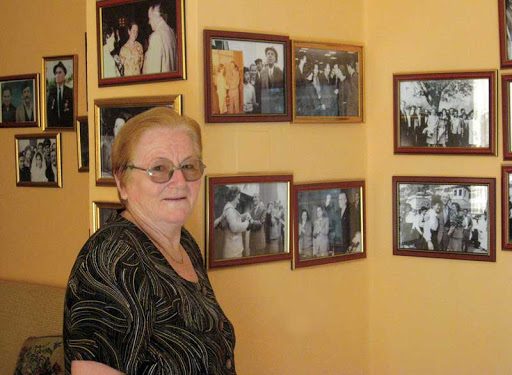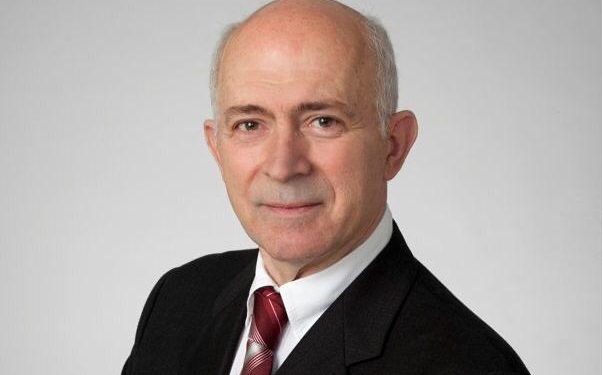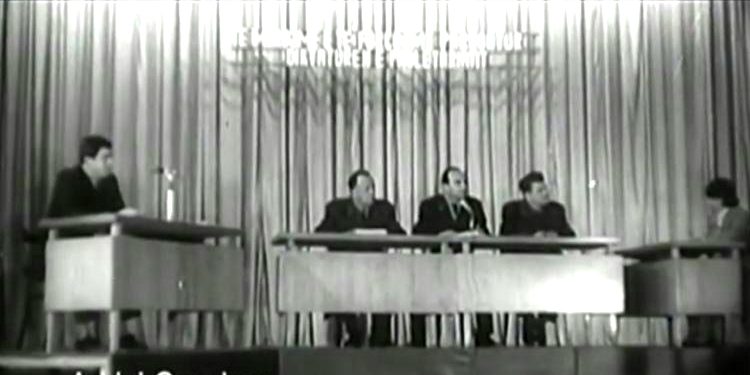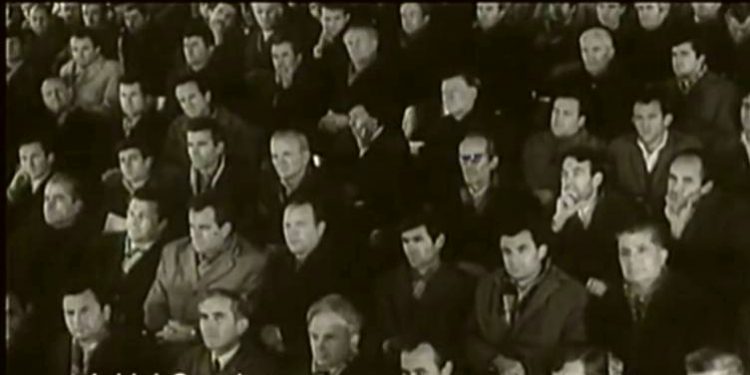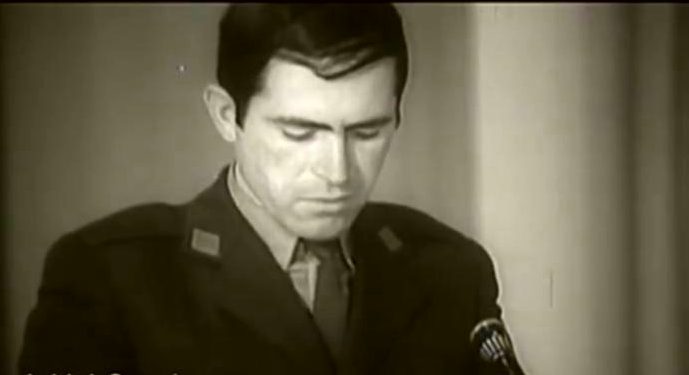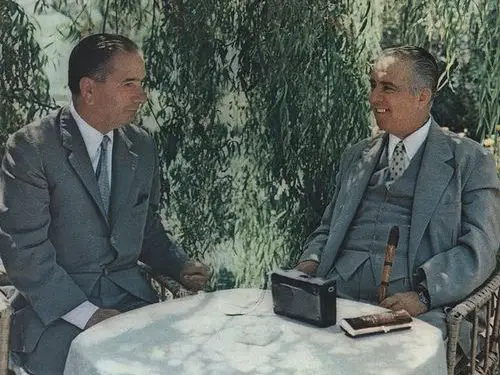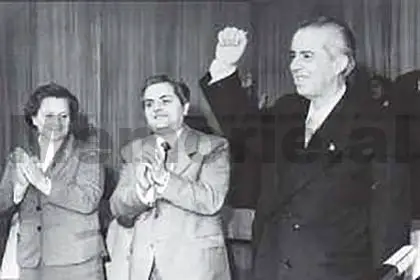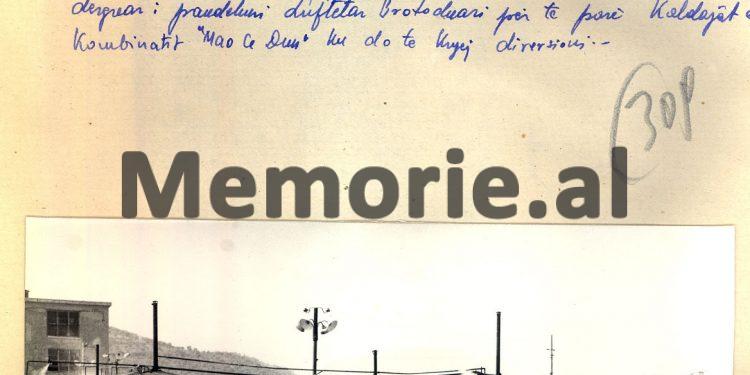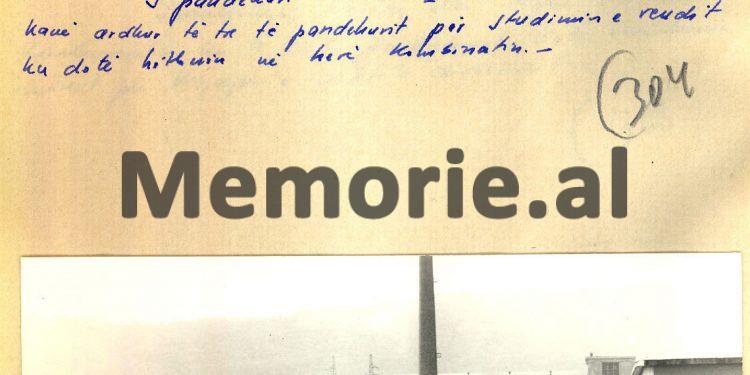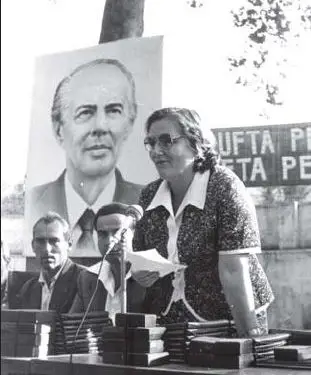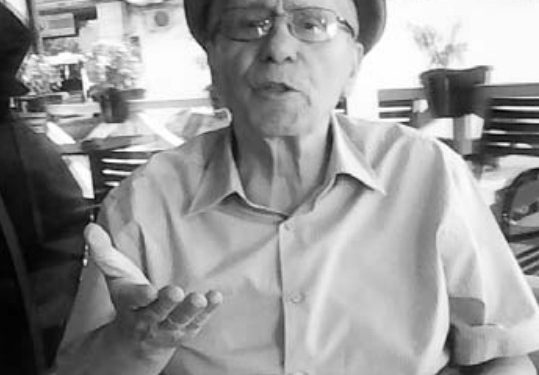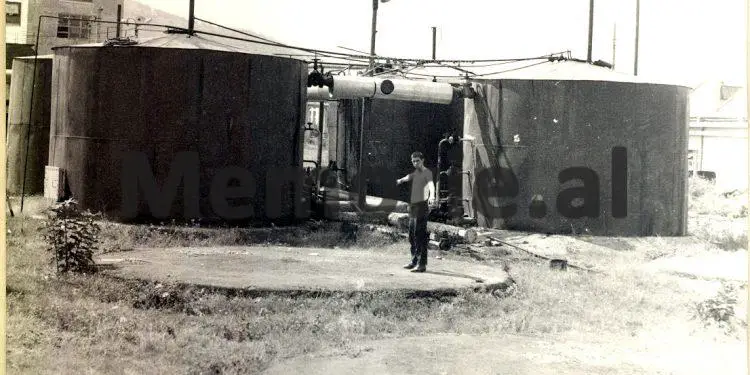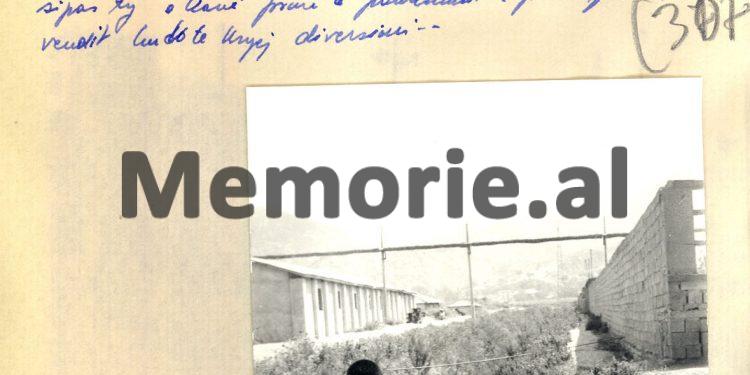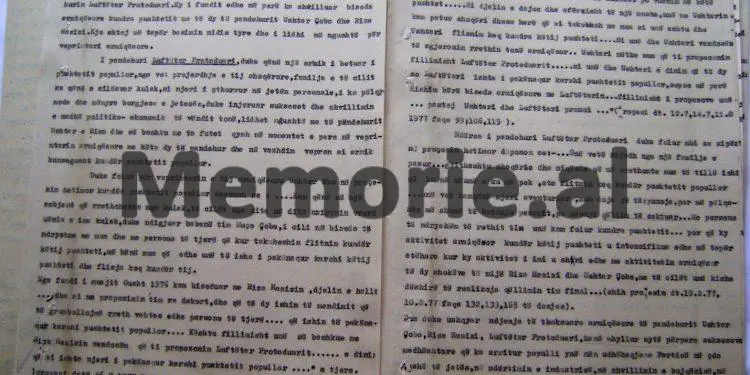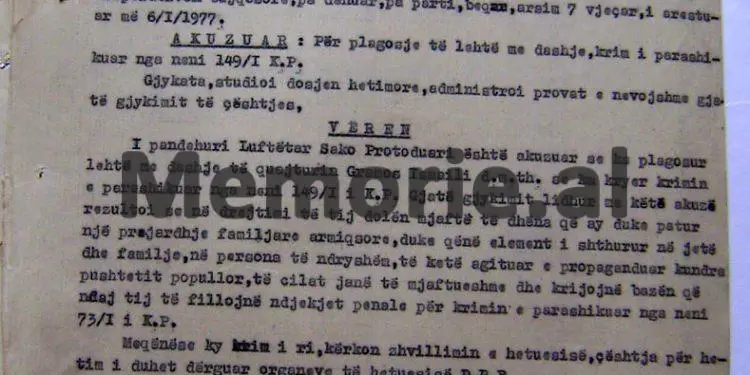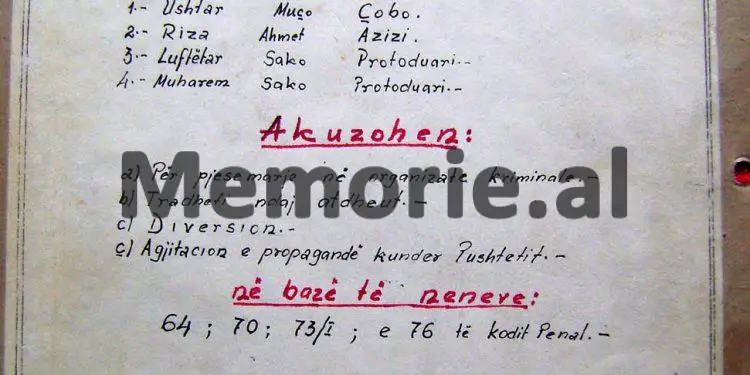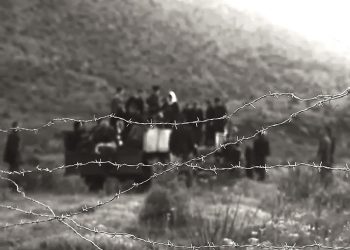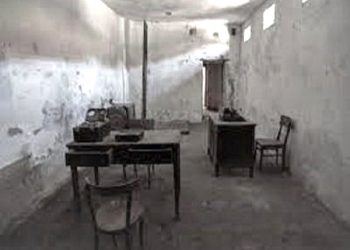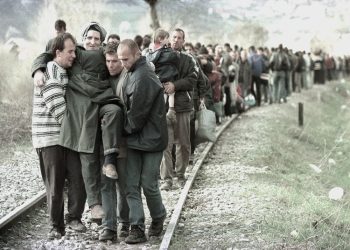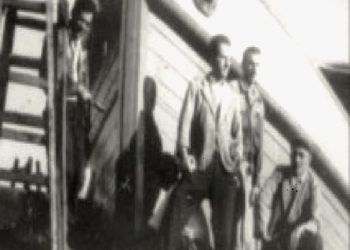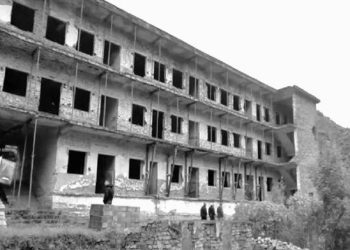By Dr. Qemal Lame
Second part
Memorie.al/The state of the dictatorship of the proletariat in the political system of the period of dictatorial socialism staged and propagated that it had “discovered” enemies, traitors, saboteurs, conspirators and coup plotters to strike and eliminate political opponents, as well as to artificially create situations that hid with the platform of class struggle to escalate state violence and divert attention from the grave problems of political, economic and social crisis. In the “Synoptic Table”, which documents the plenum of the Central Committee of the ALP that condemned the “plot of the polyagent Mehmet Shehu” with key collaborators Kadri Hazbiu, Feçorr Shehu, etc., Enver Hoxha himself said that: he has all the plots revealed Party and none of the State Security!
This statement is clearly understood by all that he was the person who had discovered and condemned the enemies of the people and the Party. His potential opponents who endangered absolute power were eliminated and condemned. Those whom he considered the most trustworthy who had been entrusted with the implementation of the orders for the elimination and disappearance of persons declared enemies were also eliminated. This method also hid the evidence, the main witnesses who could become dangerous to his idealized figure even after his death, and any case of investigations with the change of the political system, although it was thought to be eternal.
The tragedy of the violence of the dictatorial state is clearly documented in the secret agency activity of the State Security, the investigation, the prosecution and the court, which is clearly convincing in the forged case of the group that was accused and convicted of diversion and sabotage in the Textile Factory. in Berat. In this issue, we learn the serious consequences of the dictatorship for punishing innocent people through the criminal legends of the State Security, approved by the leadership of the ALP and imposed to be legislated by the investigation, the prosecution and the court.
- The trial of the group accused of “diversion, sabotage, agitation and propaganda, theft, illegal possession of weapons, etc.”, at the Textile Factory in Berat.
Continued from the previous issue
Under the Constitution, the court and the prosecution were independent constitutional bodies. Under this constitutional arrangement, the heads of the prosecution and the court were independent in the theoretical sense of constitutional principles. While in practice, in the concrete official activity, these formally independent justice institutions were evaluated less in relation to the Minister of Internal Affairs. Often the heads of the judiciary were humbly compelled to obey orders they received secretly from the Minister of the Interior, in the name and order of the chief leader.
Our only opportunity in this case, propagated with fuss and the punishment of the accused was expected to be drastic measures, was to do our legal duty, to organize the professional preparation for the trial, to demand during the trial the observance of the procedural norms of the Criminal Code and the Code of Criminal Procedure.
Judging the case was a challenge, for justice and the people’s trust in justice.
For the prosecutor and judge who were believed to successfully carry out this trial, their activity would be a great test for their professional skills and future in those tasks, as well as the fate of family life.
The prosecutor and the judge were known to be correct, objective, independent in their thoughts and procedural actions, capable and dedicated in their work and with political and moral civic guarantees.
The prosecutor and the judge were well known friends and always testified to friendly relations.
As in all official activity, in judging the case it was necessary to act with professional and moral ethics. Society and friendship would be preserved and served to realistically testify to the figure of the justice cadre. The accomplishment of duties, independent attitudes, and formal relationships would be reinforced by mutual trust and respect.
These demands took on obvious values in this case, in order to strengthen the official activity and not to create undesirable conditions that could affect the unilateral attitudes to the detriment of objectivity and the final solution, with fairness of the case and guilt or the innocence of the accused persons and sent to trial.
In order to carry out our legal duties correctly, we conceived and acted on the basis of objective judgments concretized in the strategy that would suit the observance of procedural requirements and the purpose of the trial before the people:
- First, legal and procedural principles would guide the activity of the prosecutor and the judge, as it is sanctioned and required to apply the principles provided by the Constitution, the Criminal Code, the Code of Criminal Procedure and the organic laws of the Organization of the Prosecution and the Court. The prosecutor and the judge would form the conviction and maintain their professional position on the objectivity of the file materials, based on legal conscience and independently;
- Second, the prosecutor and the judge would read, analyze, reach relevant conclusions, and act independently.
The trial was necessary to be based on strict observance of the rules provided in the Criminal Code and the Code of Criminal Procedure. The jurisdiction to adjudicate the case by the relevant court obliged it to be tried in both instances, not directly by the High Court.
For these reasons, we sought and submitted the opinion that the case should be tried by the Military College of the District Court of Fier, which had in its jurisdiction the district of Berat, according to the then organization of the Armed Forces, where military units are deployed in the district of Berat were subordinated to the command of the Fier Group.
The trial by the Military College of the High Court and the representation of the charge by the Military Prosecutor before the High Court deprived the defendants of the right to appeal in the second instance.
If the case was tried in two levels, there would be an opportunity to ascertain the possible flaws and contradictions between the defendants. Thus, we would have the opportunity to verify more concretely with additional investigations the objectivity of the evidence and assertions of the defendants and witnesses.
This request of ours was not accepted.
The firm order was given to implement the previously given guidelines, to make the necessary preparations and to conduct the trial of the case at a high level.
In these circumstances, we took the case about a week before the date previously set by the Central Committee of the ALP and began and continued the study of the materials of the voluminous file, to prepare for trial.
The preparation started immediately, as soon as they were officially presented to us and we got acquainted with the materials of the investigative file sent by the Investigation Directorate with a letter from the Minister of Internal Affairs to the Military College, to the High Court. After carefully reading and analyzing the materials of the investigative file, we were not fully convinced of the results of the investigation, the data and evidence administered, the objectivity, validity and reliability of the evidence, as well as the legal formulations made by the investigator in the indictment with which the case was sent for trial.
At this stage of the preparation and development of the trial, action was taken on the basis of procedural norms.
Even at this stage of the preparation of the trial, both, in the capacity of judge and prosecutor of the case, we exchanged views on the doubts created on the objectivity and legality of investigative actions, the objectivity of the statements of the defendants and the basis of facts and documents evidence administered in the investigative process.
We had reservations about the objectivity and breadth of the persons held criminally responsible, the facts, data and evidence administered in the documents and procedural acts, about the accuracy and reliability of the evidence presented by the State Security for arrests, as well as the evidence and formulations made in the accusations, full admission without any reprimand of guilt and responsibility in giving without any reservation of explanations by the defendants, etc.
I, as a prosecutor, and Aliu (Zanko), as the presiding judge, requested from the chief investigator and the investigators of the case concrete data to specify and clarify more concretely what was presented and documented in the procedural form in the investigative file.
Our request caused an immediate reaction from the leaders of the Ministry of Internal Affairs and the main leadership in the Central Committee of the ALP. They, through telephone conversations and in concrete meetings, presented before the President of the High Court, Aranit Çela, and the General Prosecutor, Rrapi Mino, the concern why the prosecutor and the judge request other data, when the Central Committee of the Party has evaluated the discovery and investigation. of the case and all measures have been taken to adjudicate the case before the people?!
Araniti and Rrapi called us and informed us of the reactions and concerns caused in the Ministry of Internal Affairs and in the main leadership of the Central Committee. It was emphasized that, in general, our concern and interest for the necessary clarifications was appreciated, so that the process could be judged as well as possible, but attention was drawn, emphasizing that there was no room for doubt.
By order of the Central Committee, they asked us both to act as prosecutors and military judges on the appointed date before the people, always in cooperation with the Berat District Party Committee and the Fier Group Command, to start and conduct the trial at the time that was intended by the Party leaders, not to discuss and not to create any doubt about the objectivity of the investigation and the evidence of the investigative file.
The commitment of the judge and the prosecutor to the objectivity of the investigation and the legality of the evidence was based on legal conscience to discover the truth. The case as important as a criminal offense against the state and of particular political importance for the time, was thought to be lawful and the final decision as fair as possible, based on evidence, guilt for the charges and the measure of concrete and deserved punishment, according to the criteria of the articles of the Criminal Code and the Code of Criminal Procedure.
In the legal conscience for the final settlement of the case and the guilt or innocence of the accused persons, the prosecutor and the judge had to be independent, not to be influenced by their political convictions.
In this important case, the fact that the prosecutor was a member of the Labor Party, while the judge was not a member of this party, was not affected by the unorganized party.
We had no further arguments to question the results of the investigation and the trial procedure of the case.
The only way to clarify our suspicions was to conduct objectively the court hearings and to assess with skill and justice the guilt of the persons accused of very serious crimes and made publicly known for the social danger propagated by the Party organs for this. saboteur group, diversionist etc.
The correctness in the application of the procedural rules and the professional ability were reflected by the judge and the prosecutor immediately, from the first session, after the trial started. We would act in accordance with the law, but we would also verify our concerns about the objectivity of the investigation and trial of the case.
We thought that according to the Code of Criminal Procedure, after the opening of the court session, after the defendants were given the floor, they should hear the free explanations of the defendants, without interfering with questions. This method had two important purposes:
- By leaving the defendants free in their explanations, they would also hear their opinions directly. Normally, they had the right to give their opinions and to defend themselves against the charges with as many rights as provided in the Code of Criminal Procedure, although the right of legal protection was not recognized by the defense counsel. Based on their free statements at the hearing, we would have the right to verify their statements to the investigator and other documents on which the serious allegations were based.
- To enable the defendants to appear freely before the court and the people present for their charges, evidence and guilt. Under the Code of Criminal Procedure, they would have the real opportunity to freely express their views on guilt and the charges made by the investigator.
- In case there were complaints and objections from the defendants, they would be made public and a precedent would be set to clarify the defendants’ suspicions.
Our method had its positive side, as it could clarify the suspicions based on interference and violation of legal norms in the objectivity of the investigation, evidence and charges against the defendants.
Achieving our goal would have risks and difficulties.
We were convinced that:
- First, that as it was done in secret in the practice of the State Security bodies, the Police and the investigation, the Branch of Internal Affairs, where the investigation was also organized, would continue to keep the investigative and judicial process under control in secret. . Defendants would continue to remain under pressure, possibly adding to pressure, suggestions and illegal promises.
- Second, the heads of these bodies and those who had conducted the operational prosecution and investigation of the case, would take every possible measure to ensure that the defendants and witnesses maintain their affirmative attitude towards the accusations and evidence even before the court. how to intervene with the trial panel to impose a lenient sentence or innocence, etc.
In close social circles it was also said that the leaders of security, police, investigation, operatives, investigators, etc., even went so far as to suggest the defendants with absurd initiatives, promisingly and illegally promising them relief in the sentence. even innocence, et., if they would continue to give the same explanations during the trial, as those fixed in the investigative minutes.
It was later learned that there were also influences in various forms, including concrete suggestions and concrete mental and physical violence.
Following the example of the main leadership interventions in the Central Committee in the most important criminal cases, the great influence of the first secretaries was used to support the interests of the operational work by intervening directly and concretely in the heads of the prosecution and the court in the center and in districts.
Therefore, the best option was to take and record directly the statements of the defendants in the minutes of the court session.
The hall was completely filled with well-controlled persons. In the first row were the chairman and the main staff of the internal affairs branch, the chief of investigation, the case investigator and other investigators, the staff of the branch, the prosecution, the court, the party committee, the executive committee, etc.
The trial of the case started as we had decided before. After the indictment was read, he gave the floor to the defendants to briefly state their views, according to the criteria of the Code of Criminal Procedure. The defendants were released to give their explanations. Some questions were asked to guide them to the legal right of the procedure for explanations before the trial panel, without being influenced by what they had previously done to the investigator.
These interventions made by the prosecutor, reading and interpreting carefully and within the norms of the Code of Criminal Procedure, were intended to acquaint the defendants with their legal rights of defense in court, to have confidence in the trial panel in adjudicating the case. of them.
Based on the prediction made, it was thought that, clearly, the defendants would understand their situation, trust the trial panel and the prosecutor, explain objectively the guilt of the charges against them, not be influenced from previous explanations to the investigator, to have confidence that the changes in the statements would be carefully verified, not to be afraid of pressures, promises or suggestions that might have been made at the time of their arrest and investigation, etc.
About an hour after the beginning of the court session, at the time when the trial was going on normally, the President of the Internal Affairs Branch, Pëllumb Kapo, intervened, who had temporarily left him and returned. As soon as he entered the door, he nodded and waved to the presiding judge of the case, Ali, to take a break.
After the explanations of the defendant Muharrem Protoduari, Aliu talked to the two assistant judges and declared a short break, fifteen minutes.
Immediately, on our way to the podium, Pëllumb Kapo came. He told us he had orders and asked us to go urgently to meet the first secretary, Mine Guri.
We asked why this request was made. But from him, we were not given explanations for this urgent call to the party committee, made at the time when the trial of the case had begun.
In the car of the district court president, we went and met the first secretary in her office. Also, present were the branch president with his deputy and the operational worker who had followed the elaboration and realization of the agency case.
Mine Guri, immediately communicate to us the concern caused for the start of the trial, in the main leadership of the Central Committee of the ALP:
- I was called by the secretary of the Central Committee, comrades Hysni Kapo and Ramiz Alia, by order of the eldest (Enver Hoxha). The main leader draws attention to the fact that the prosecutor and the presiding judge of the court session are not unmasking the defendants. The exemplary trial that was supposed to take place at the Palace of Culture is not achieving its intended political purpose.
- Why were the orders given by the leadership not implemented?! What is happening to the prosecutor and the judge of the case?! Get your attention seriously! To be immediately reflected by the prosecutor and the presiding judge! To expose the defendants, to punish them with the utmost severity and with the most severe punishment measures, for the accusations of hostile diversionist activity, sabotage, etc./Memorie. al




